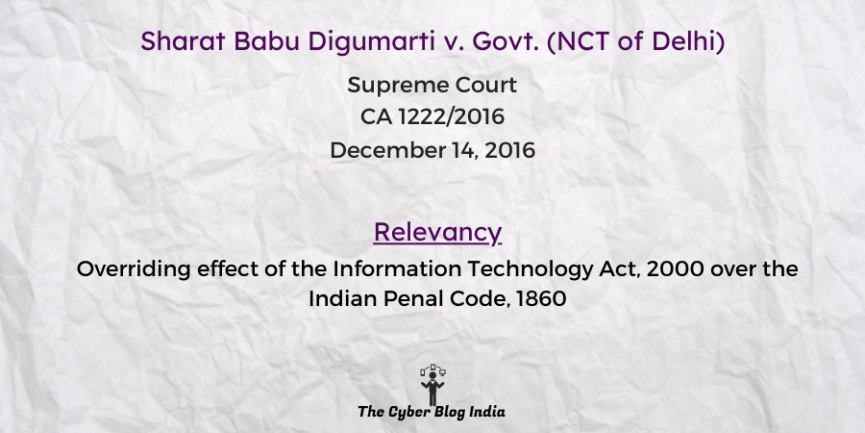Sharat Babu Digumarti v. Govt. (NCT of Delhi)

Sharat Babu Digumarti v. Govt. (NCT of Delhi)
(2017) 2 SCC 18
In the Supreme Court of India
CA 1222/2016
Before Justice Dipak Misra and Justice Prafulla C Pant
Decided on December 14, 2016
Relevancy of the case: Overriding effect of the Information Technology Act, 2000 over the Indian Penal Code, 1860
Statutes and Provisions Involved
- The Information Technology Act, 2000 (Section 67, 67A, 67B, 79, 81, 85)
- The Indian Penal Code, 1860 (Section 292, 294)
- The Code of Criminal Procedure, 1973 (Section 482)
Relevant Facts of the Case
- Initially, A filed a petition in the High Court to quash the ongoing trial court case and was discharged under Section 294 and 292 of the Indian Penal Code, 1860.
- But later, the trial court still framed the charge under Section 292. He filed a review petition in the High Court, which the court dismissed.
- The appellant challenges this dismissal order of the High Court in the present appeal.
Prominent Arguments by the Advocates
- The petitioner’s counsel argued that he cannot be prosecuted under Section 292 of the Indian Penal Code, 1860 after charges under Section 67 of the Information Technology Act, 2000. As a special provision, it will override Section 292. Further, even if the allegations are true, the appellant won’t be held liable under Section 79 of the Information Technology Act, 2000.
- The respondent’s counsel argued that the two sections are distinct and that one can be charged independently with both of them.
Opinion of the Bench
- Section 67, read with 67A and 67B, forms a complete code for offences under the Information Technology Act, 2000.
- Once the offence has a connection with an electronic record, the court will give protection under Section 79. The Information Technology Act, 2000 is a special law and will have an overriding effect over Section 292 of the Indian Penal Code, 1860 in this case.
Final Decision
- Petition allowed.
- Criminal prosecution against the appellant quashed.
